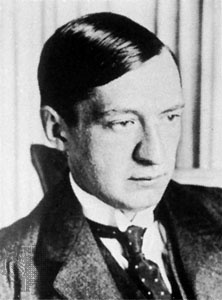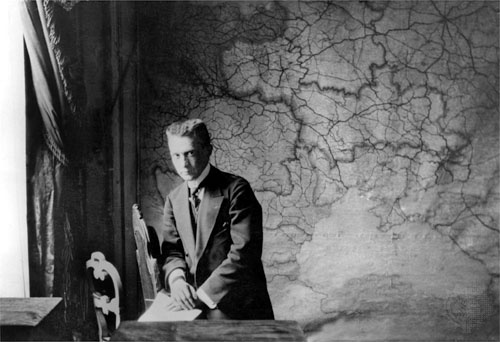Kerensky, Aleksandr Fyodorovich
prime minister of Russia
born April 22 【May 2, New Style】, 1881, Simbirsk 【now Ulyanovsk】, Russia
died June 11, 1970, New York, N.Y., U.S.
 moderate socialist revolutionary who served as head of the Russian provisional government from July to October 1917 (Old Style).
moderate socialist revolutionary who served as head of the Russian provisional government from July to October 1917 (Old Style).While studying law at the University of St. Petersburg, Kerensky was attracted to the Narodniki (or populist) revolutionary movement. After graduating (1904), he joined the Socialist Revolutionary Party (c. 1905) and became a prominent lawyer, frequently defending revolutionaries accused of political offenses. In 1912 he was elected to the fourth Duma as a Trudoviki (Labour Group) delegate from Volsk (in Saratov province), and in the next several years he gained a reputation as an eloquent, dynamic politician of the moderate left.
 Unlike some of the more radical socialists, he supported Russia's participation in World War I. He became increasingly disappointed with the tsarist regime's conduct of the war effort, however, and, when the February Revolution (Russian Revolution of 1917) broke out (1917), he urged the dissolution of the monarchy. He enthusiastically accepted the posts of vice chairman of the Petrograd Soviet of Workers' and Soldiers' Deputies and of minister of justice in the provisional government, formed by the Duma. The only person to hold positions in both governing bodies, he assumed the role of liaison between them. He instituted basic civil liberties—e.g., the freedoms of speech, press, assembly, and religion; universal suffrage; and equal rights for women—throughout Russia and became one of the most widely known and popular figures among the revolutionary leadership.
Unlike some of the more radical socialists, he supported Russia's participation in World War I. He became increasingly disappointed with the tsarist regime's conduct of the war effort, however, and, when the February Revolution (Russian Revolution of 1917) broke out (1917), he urged the dissolution of the monarchy. He enthusiastically accepted the posts of vice chairman of the Petrograd Soviet of Workers' and Soldiers' Deputies and of minister of justice in the provisional government, formed by the Duma. The only person to hold positions in both governing bodies, he assumed the role of liaison between them. He instituted basic civil liberties—e.g., the freedoms of speech, press, assembly, and religion; universal suffrage; and equal rights for women—throughout Russia and became one of the most widely known and popular figures among the revolutionary leadership.In May, when a public uproar over the announcement of Russia's war aims (which Kerensky had approved) forced several ministers to resign, Kerensky was transferred to the posts of minister of war and of the navy and became the dominant personality in the new government. He subsequently planned a new offensive and toured the front, using his inspiring rhetoric to instill in the demoralized troops a desire to renew their efforts and defend the revolution. His eloquence, however, proved inadequate compensation for war weariness and lack of military discipline. Kerensky's June Offensive was an unmitigated failure.
When the provisional government was again compelled to reorganize in July, Kerensky, who adhered to no rigid political dogma and whose dramatic oratorical style appeared to win him broad popular support, became prime minister. Despite his efforts to unite all political factions, he soon alienated the moderates and the officers' corps by summarily dismissing his commander in chief, General Lavr G. Kornilov (Kornilov, Lavr Georgiyevich), and personally replacing him (September); he also lost the confidence of the left wing by refusing to implement their radical social and economic programs and by apparently planning to assume dictatorial powers.
Consequently, when the Bolsheviks seized power (October Revolution, 1917), Kerensky, who escaped to the front, was unable to gather forces to defend his government. He remained in hiding until May 1918, when he emigrated to western Europe and devoted himself to writing books on the revolution and editing émigré newspapers and journals. In 1940 he moved to the United States, where he lectured at universities and continued to write books on his revolutionary experiences.